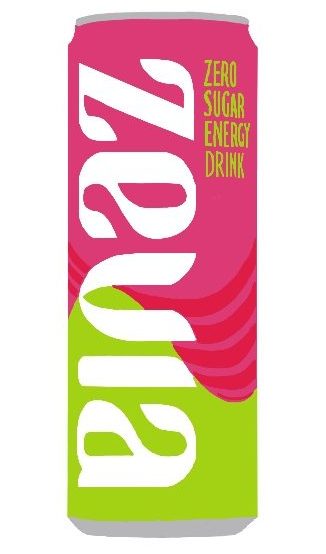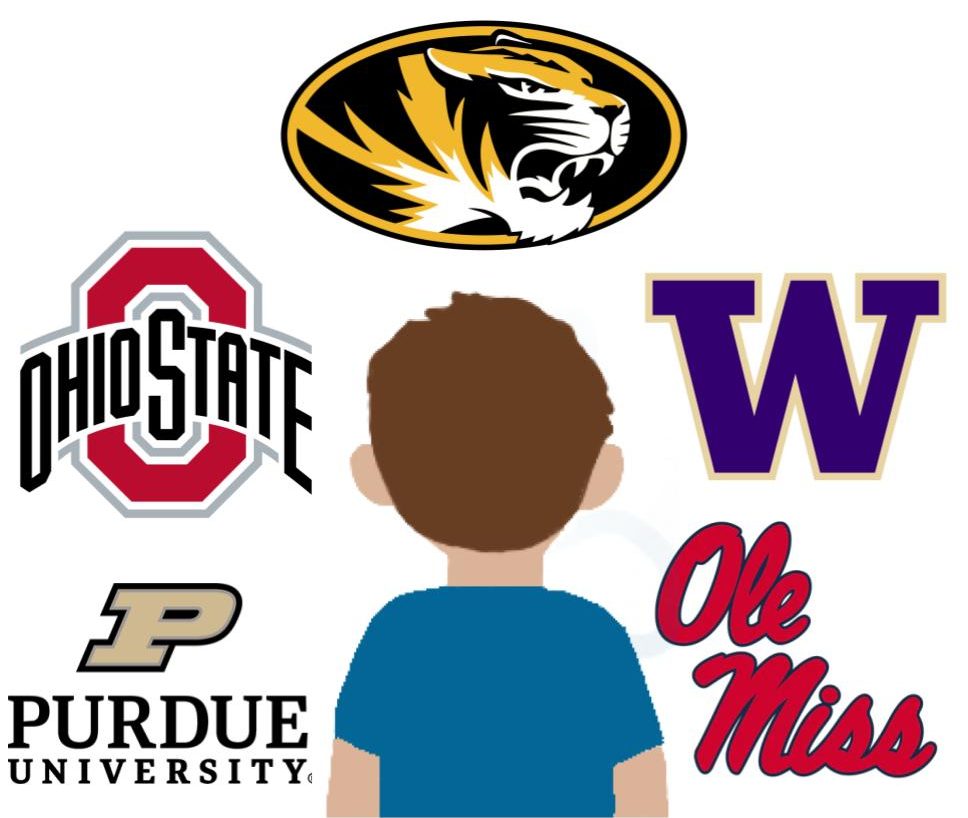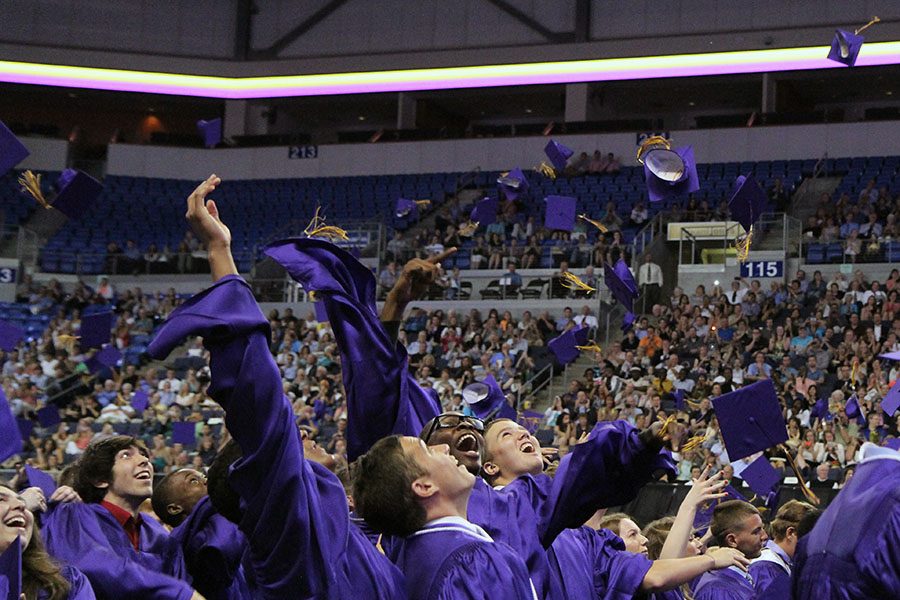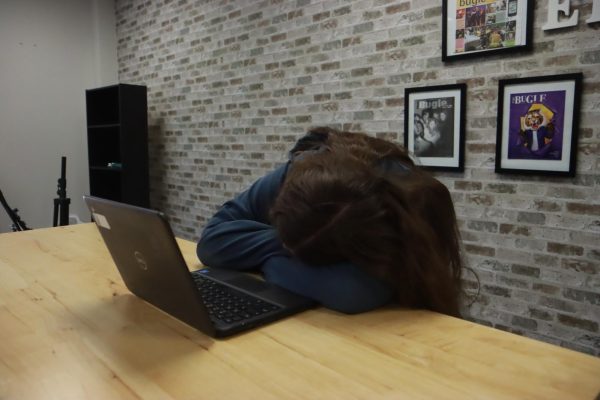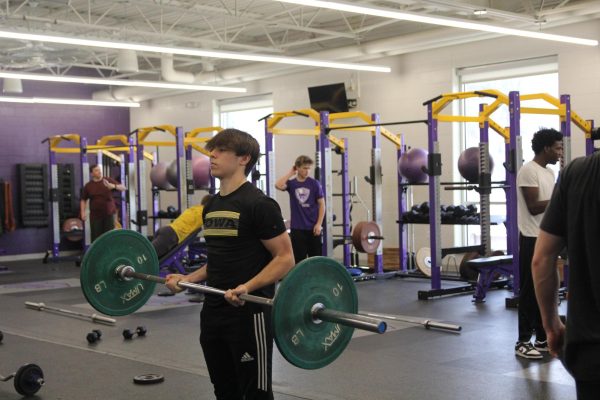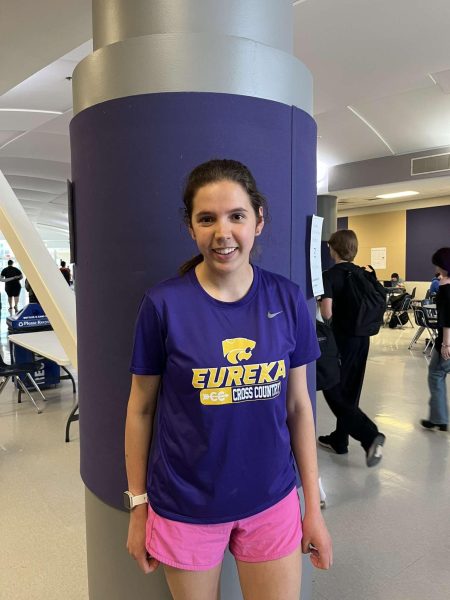So long scantrons
District reviews final exam practices
EHS finals could have a different look and format in the coming years that involves less cramming and more freedom. For a student that stresses over finals each semester, this could be something to celebrate.
As Semester 1 grades post and finals and their effects are locked into students grades, the district is gearing up to review its final exam policy and approach.
In order for finals to help students’ composite semester grades, those students have to perform better than they they did for the entire semester; otherwise student performance on finals hurts students’ composite semester grades.
“It’s definitely stressful,” Zach Valentine (10) said. “There’s a lot of pressure to have your grades and your GPA where you want it to be, and it’s not always attainable. There’s a lot of pressure to get it there or keep it where you want.”
Finals force students to play the numbers game, which is often how poorly can students perform and maintain their current grade since improving is statistically unlikely.
Sarah has an 89.3 percent in Biology. If she wants to get an A (90 percent) for the semester, she needs to get a 92.8 percent on the final. That is high-stakes testing.
“In college a lot of times you have maybe two tests an entire semester,” Mandy Kotraba, science teacher, said. “I think high-stakes tests like that are good practice. Not everyone’s going to college, though.”
The stress of finals can be overwhelming. Take into account that one out of every four students ages 13-18 struggle with some sort of anxiety disorder and that stress turns into a personal crisis that can infect the entire family.
“I have to do a lot,” Alisyne Hollowood (10) said. “I have to get with the teacher and make sure I know what I’m doing with the study guides for the finals, so I just have to prepare a lot.”
The pressure that students experience is justified as statistics show that finals in their current form do more harm than good to student learning.
In addition to finding time to study for finals, students must also take their last tests of the semester. Though they are a burden to carry, these tests still asses how students understood a lesson that will appear on the final.
“We’re still trying to make sure we are assessing various skills,” Mary Wisdom, math teacher, said. “Each of those unit tests represent a chunk of skills that we want to make sure each of those kids are able to do and then we have that piece before we go into the final to know whether that’s an area they mastered.”
The question is if final exams are the best way for the students to show the teacher what they have learned throughout the semester.
“I would be perfectly content if we didn’t have finals,” Kylee Bowling (11) said. “Especially because a lot of my grades are borderline. I’m either going to be screwed or I’m not. It’s iffy. It’s very stressful, especially with balancing school, work and free time.”
The mission of District Final Exam Committee is to assess if the current final exam process is helping or hurting the learning experience.
In the Rockwood School District, the average final semester grade is an 83%, but the average final exam score is a 79%, Dan Thoman, 12 grade principal, communicated in an email to all faculty soliciting feedback on finals .
Finals don’t have to be what they are right now. Rockwood’s policies provide room for final exams to evolve.
Rockwood School District Policy 6451 states that “Semester final exams should be used to assess student achievement on the major goals and objectives of a course.”
For such general parameters, the majority of classes stick to the same type of final exam format. A typical final, especially in a core class, tends to consist of multiple choice and essay sections that are designed to take about an hour each so the exam fills the two-hour time slot.
“Basically, everything we do is out of tradition,” Bryan Clar, District Final Exam Committee member, said. “There’s very little in there except that we have to have finals, so how we do that and how much weight goes into it is something that is definitely up for grabs.”
The general Rockwood policy gives way for faculty to update their finals to a format that would be most effective in figuring out what students know.
The Rockwood District Final Exam committee is looking into beneficial alternatives for finals.
One alternative that the committee is considering is a project-based final commonly called a capstone.
The Glossary of Educational Reform defines a capstone as “a multifaceted assignment that serves as a culminating academic and intellectual experience for students,”
Capstones can often take the form of a spoken presentation or a visual project.
“That’d actually be really cool for a lot of people who are more visual or hands-on learners,” Will Chasin (11) said. “Variety in education is an important thing. I could probably emphasize my knowledge whereas kids couldn’t necessarily prove their knowledge in a testing environment.”
A final exam is intended to give teachers a glimpse at what standards students have mastered and what they have not. This gives teachers feedback for how they should teach their lessons in future years.
“In the math department, in general, we try to put information on there to assess those [standards],” Mary Wisdom, math teacher, said. “But the other factor that goes into it is that kids play the game of ‘I know what I have to get on my final in order to keep a C,’ so I don’t know if we are always able to really assess what we are hoping to assess because kids might do a minimal amount of preparation for that very reason.”
The numbers game that final exams currently create encourages a culture that emphasizes cramming just enough to obtain the necessary score for a desired grade.
A more student-centered format gives way for more freedom and initiative over what students are assessed over than a typical sit-down final.
“I could use creativity more than just filling out facts.” Monica Zesch (10) said.
Upperclassmen in college are most likely to do a capstone project, and but there are high schools all over the country who use this approach, too. program as well.
High schools that have been deemed as some of the most innovative in the country have already taken advantage of this concept.
At Brightworks School in San Francisco, the finals process known as “Exposition” consists of students presenting what they learned to their local community in a presentational format.
THINK Global School in New York City uses a project-based format that is designed to answer the key questions learned in each term.
Though the ideas of these schools make it so that an entire school is shaped around project-based learning, there are also ways for schools to only implement this for interested students.
“That would be cool,” Joshua Samuel (11) said. “It’s changing it up a little bit and you might learn something new while you’re doing the final as well as accomplishing it.”
One of the AP programs offered by College Board, AP Capstone, uses this concept as well.
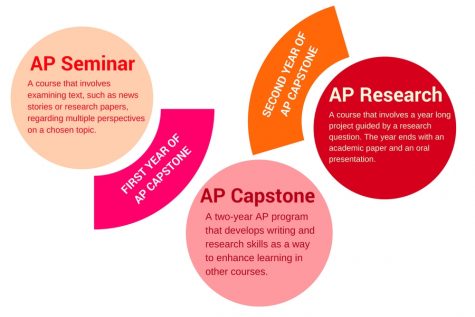
AP Capstone is divided into two year-long classes. The first year is AP Seminar, where a student researches deeper into the topics they learn in other AP classes.
The program culminates with a research paper and an oral presentation to display what they have learned, which is completed in AP Research, the second year of the program.
In Missouri, Affton High School, Branson High School, David H Hickman High School, Park Hill High School and Smithsville R-II High School have the AP Capstone Program at their schools.
EHS doesn’t necessarily have to implement this specific program, but with Rockwood’s general policy for final exams, EHS can definitely try something different if it means benefiting student learning.
“Well, the committee has just started meeting,” Thoman said. “We only had a few hours, so we discussed what our finals look like, what we desire of students, do they connect, do they match, what can we do with our final exam procedure and policy to make that more connected.”
Though the District Final Exam Committee is relatively new, they seem committed to figuring out what formats will benefit their students the most.
The District Final Exam Committee has only met once so far, but they have already thrown around ideas.
In addition to the idea of switching to a project-based final, the committee has discussed the idea of getting rid of exemptions.
Rockwood School District Regulation 6451 examines the high school final exemption rules: According to the regulation, the exemption policy is mandatory for all classes. Each high schooler can exempt one of their finals each semester. Exceptions include:
- First semester freshmen, who cannot exempt from any finals
- Second semester seniors, who can exempt from all finals for classes they have an unweighted A in at the time of the exam
- Students in AP classes, who during second semester can exempt the final exam for an AP course (in addition to the one final that the district allows) if they both:
– Take the national exam for the course
– Have at least an unweighted B in the course at the time of the final exam
However:
- Students in AP courses cannot exempt the finals for those courses during first semester
- Students in ALAR/P can exempt from their final exam, but not their final presentation
The committee has raised questions in regards to if these exemptions should even exist anymore.
“The exemptions are a concern,” Clar said. “If kids are exempting, we don’t really know which kids are getting everything at the end and which kids are just doing enough to keep the grade they have.”
This is just one of many discussions within the committee.
In their first meeting, the committee also discussed
- Keeping the weight of the final at 20% of the final grade
- Making the weight of the final different depending on the class
- Keeping finals at two hours in length
- The necessity of requiring each class to even have a final
- Giving discretion over finals to each department
Since they have only met once, the committee has much to ponder about the future of finals exams.
“Will it change for next year? I don’t know,” Thoman said. “They’re probably thinking about that. There’s a lot to talk about, so if we can get it done, we’ll try.”
As students continue to receive their finals grades in classes and evaluate their performances on their finals, the committee must evaluate the final exam process for the good of the students taking them.
This numbers game isn’t helping anyone.
Your donation will support the student journalists of Eureka High School - MO. Your contribution will allow us to purchase equipment and cover our annual website hosting costs.
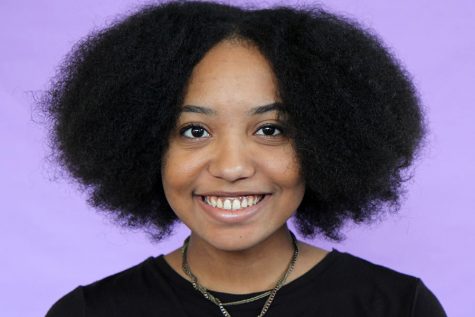
@mperezEHS_hub
This is Perez's third year on staff where she serves as a reporter for the Hub. One word to describe her: independent. Perez is involved...
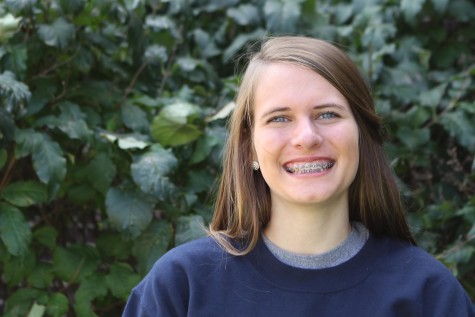
Courtney's love for photography and her desire to become a photojournalist caused her to join the Eurekana staff. Entering her second year on staff, she...



